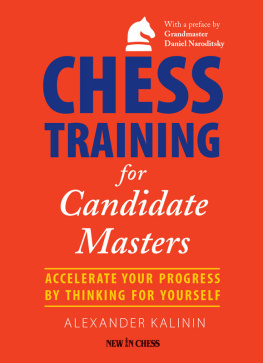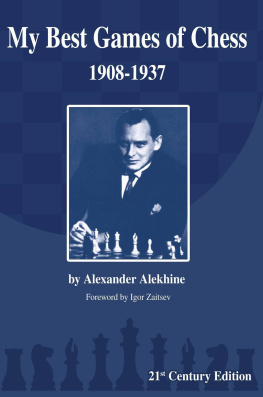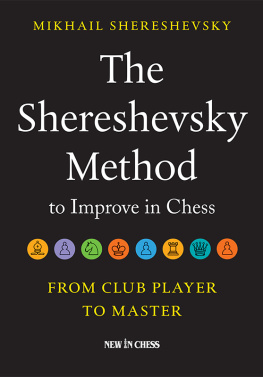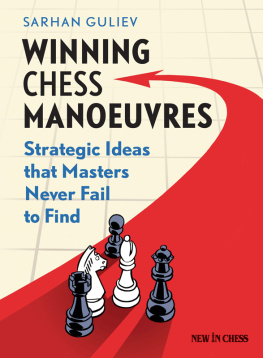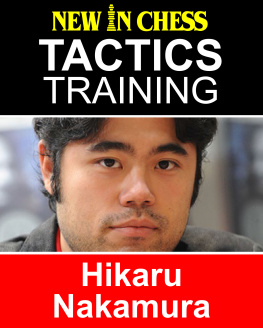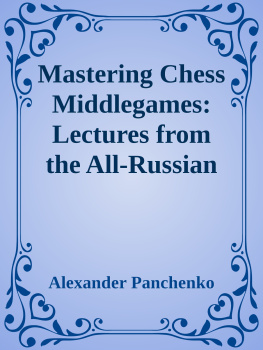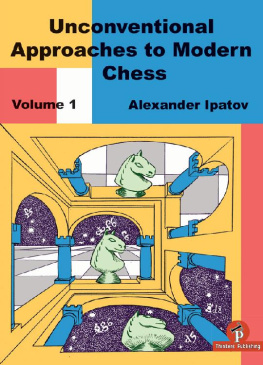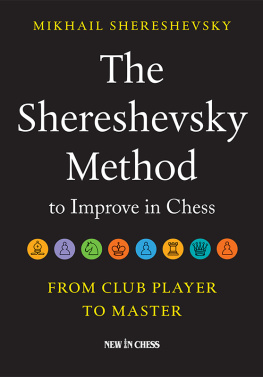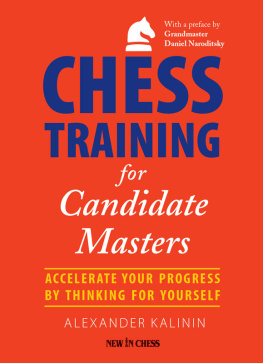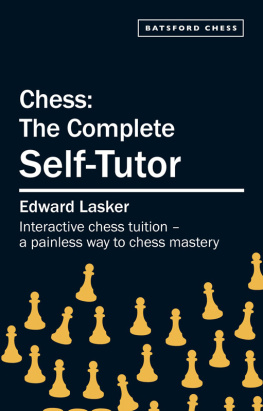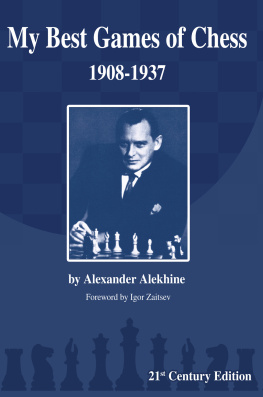Alexander Kalinin [Kalinin - Chess Training for Candidate Masters: Accelerate Your Progress by Thinking for Yourself
Here you can read online Alexander Kalinin [Kalinin - Chess Training for Candidate Masters: Accelerate Your Progress by Thinking for Yourself full text of the book (entire story) in english for free. Download pdf and epub, get meaning, cover and reviews about this ebook. year: 2017, publisher: New in Chess, genre: Romance novel. Description of the work, (preface) as well as reviews are available. Best literature library LitArk.com created for fans of good reading and offers a wide selection of genres:
Romance novel
Science fiction
Adventure
Detective
Science
History
Home and family
Prose
Art
Politics
Computer
Non-fiction
Religion
Business
Children
Humor
Choose a favorite category and find really read worthwhile books. Enjoy immersion in the world of imagination, feel the emotions of the characters or learn something new for yourself, make an fascinating discovery.
- Book:Chess Training for Candidate Masters: Accelerate Your Progress by Thinking for Yourself
- Author:
- Publisher:New in Chess
- Genre:
- Year:2017
- Rating:3 / 5
- Favourites:Add to favourites
- Your mark:
- 60
- 1
- 2
- 3
- 4
- 5
Chess Training for Candidate Masters: Accelerate Your Progress by Thinking for Yourself: summary, description and annotation
We offer to read an annotation, description, summary or preface (depends on what the author of the book "Chess Training for Candidate Masters: Accelerate Your Progress by Thinking for Yourself" wrote himself). If you haven't found the necessary information about the book — write in the comments, we will try to find it.
Alexander Kalinin [Kalinin: author's other books
Who wrote Chess Training for Candidate Masters: Accelerate Your Progress by Thinking for Yourself? Find out the surname, the name of the author of the book and a list of all author's works by series.
Chess Training for Candidate Masters: Accelerate Your Progress by Thinking for Yourself — read online for free the complete book (whole text) full work
Below is the text of the book, divided by pages. System saving the place of the last page read, allows you to conveniently read the book "Chess Training for Candidate Masters: Accelerate Your Progress by Thinking for Yourself" online for free, without having to search again every time where you left off. Put a bookmark, and you can go to the page where you finished reading at any time.
Font size:
Interval:
Bookmark:
Chess Training for Candidate Masters
Alexander Kalinin
Chess Training for Candidate Masters
Accelerate Your Progress by Thinking for Yourself
New In Chess 2017
2017 New In Chess
Published by New In Chess, Alkmaar, The Netherlands
www.newinchess.com
All rights reserved. No part of this book may be reproduced, stored in a retrieval system or transmitted in any form or by any means, electronic, mechanical, photocopying, recording or otherwise, without the prior written permission from the publisher.
Cover design: Volken Beck
Supervision: Peter Boel
Translation: Steve Giddins
Editing and typesetting: Frank Erwich
Proofreading: Maaike Keetman
Production: Anton Schermer
Have you found any errors in this book?
Please send your remarks to and implement them in a possible next edition.
ISBN: 978-90-5691-715-9
Contents
Foreword
November 28, 2007 is a day that I will remember fondly for the rest of my time on this earth. It was the day I won my final round game at the under-12 World Youth Chess Championship in Antalya, Turkey, securing the gold medal. Every moment from the second I woke up to the instant I went to sleep on that day is seared into my mind, but one episode stands out among the others.
After my opponent Ivan Bukavshin, who would go on to become one of Russias strongest young grandmasters before tragically succumbing to a premature death in January 2016 extended his hand in resignation, I could barely contain my excitement. I wanted to jump on every table, yell in unbridled excitement, hug everything that resembled a human being. Upon exiting the tournament hall, I was met by my mother and my coach, GM Alexander (Sasha) Kalinin, who was helping me at the tournament and whose book you now hold in your hands. After the obligatory embraces and words of congratulations, Sasha and I made eye contact. Following every previous game win, lose or draw we had made it a ritual to return to my hotel room and briefly analyse the game before going out to dinner. The dilemma here was obvious: every part of my brain wanted to jump on the bed and celebrate. I had just won the World Youth, who cares about analysing the game?!
But you can probably guess what happened. The three of us returned to my room, my mother took out her phone to text the good news to friends and relatives (most of whom, including my math teacher, were wide awake despite the ungodly hour), and Sasha and I set up the pieces. Then, we analysed my game just like we had analysed the 10 previous ones, concentrating on my inaccuracies and delving deep into the complex opening. Only after we finished our ritual did the bed-jumping begin!
As this episode demonstrates, Alexander Kalinin is a consummate chess professional. Do not be fooled by his (relatively) modest rating or his fairly unknown status in the western chess community: his chess understanding, coupled with his ability to verbalize this understanding in eloquent and concise fashion, is virtually unequalled in the chess world. I worked with Sasha for approximately 4 years, from early 2005 to late 2008, and during this time I grew immeasurably both as a chess player and as a human being. On my ChessBase screen, I still have a database called Kalinin Lessons that I consult very frequently. In this database are more than 500 instructive games that we went over during our lessons; more than half of them are underrated treasures from obscure Soviet tournaments. You will find many of those games in this volume.
Most importantly, Sasha is perfectly in tune with the strengths, tendencies, and weaknesses of the modern generation, as well as the general direction in which the chess world is heading (think chess computers, and how our own thinking has changed as a result). His approach to chess pedagogy is grounded in a classic understanding of the game, but he does not cling to outmoded chess concepts in a kind of misguided Luddism that has become fashionable with some coaches nowadays. Rather, he seamlessly interweaves his chess philosophy with an acute understanding of what modern chess players struggle with and what they must do in order to improve.
But you should not take my word for it; turn the page, and see for yourself! The thoughts and positions laid out in this work are pure gold; I firmly believe that a close reading of the wisdom contained within this volume will immensely benefit a chess player of virtually any strength. This is not just another entry into the ever-growing mass of chess literature. It tackles a litany of crucial themes that one simply has to master in order to become a serious chess player. Both chess players and chess teachers will find this work a treasure trove.
Before I sign off and hand over the reins to Sasha, I will share one more episode from my collaboration with Kalinin that I remember very fondly. In August 2006, Sasha came to the United States to train with me for a month. One evening, my parents close friends came over for dinner. I knew that a long conversation on non-chess themes was forthcoming. Sasha knew this as well, and just before we came downstairs, he set up the following position, which you will find on page 64 of this book:

Kalinins Study (Magadanskaya Pravda 1985)
I ruminated over this position all dinner long, casting furtive smiles Kalinins way as I began to work out the main line. When I finally came up with the solution in between mouthfuls of salad I flashed a big grin that surprised everyone at the table. So many years later, I still remember this moment (and Kalinins visit as a whole) with more than a measure of fondness. Reading this book has allowed me the rare pleasure of reliving some of my experiences, and it will allow you, dear reader, to broaden your perspective and improve your understanding of our beloved game in a way that you never thought possible. Happy reading!
GM Daniel Naroditsky
San Francisco, California
November 22, 2016

Alexander Kalinin (left) and the author of the Foreword, Daniel Naroditsky, around the time of the World Youth.
INTRODUCTION
How to train the masters of the future
Dedicated to my chess teacher
Everything is new that has been long forgotten. Todays young players, growing up with the computer, know little of the methods of improvement used in the 20th century, and regard them as hopelessly outdated. But it is within these methods, in which is concentrated the precious experience of past generations of masters and trainers, that the secrets of the development of chess creativity resides.
There is no question that in our computerised age, a mass of possibilities have opened up before chess lovers! With the aid of the internet, despite being located thousands of kilometres away, we can follow live all the significant tournaments of the day, can try to guess the grandmasters moves, and have the benefit of expert commentary. Such live participation in strong tournaments has long been considered a highly effective method of training. We can play against opponents from all round the world, at different time controls, not only solving concrete chess tasks, but also interacting with players from other countries. We have at our disposal computer courses in different aspects of the game, whilst powerful playing programs are there to correct our mistakes and suggest improvements in our games and analyses. Those wishing to study endgames can make use of the famous Nalimov tablebases. One can go on indefinitely, listing the benefits of technical progress. Instead, we will limit ourselves to acknowledging openly that the use of the computer has significantly enlarged and deepened our understanding of the ancient game.
Next pageFont size:
Interval:
Bookmark:
Similar books «Chess Training for Candidate Masters: Accelerate Your Progress by Thinking for Yourself»
Look at similar books to Chess Training for Candidate Masters: Accelerate Your Progress by Thinking for Yourself. We have selected literature similar in name and meaning in the hope of providing readers with more options to find new, interesting, not yet read works.
Discussion, reviews of the book Chess Training for Candidate Masters: Accelerate Your Progress by Thinking for Yourself and just readers' own opinions. Leave your comments, write what you think about the work, its meaning or the main characters. Specify what exactly you liked and what you didn't like, and why you think so.

